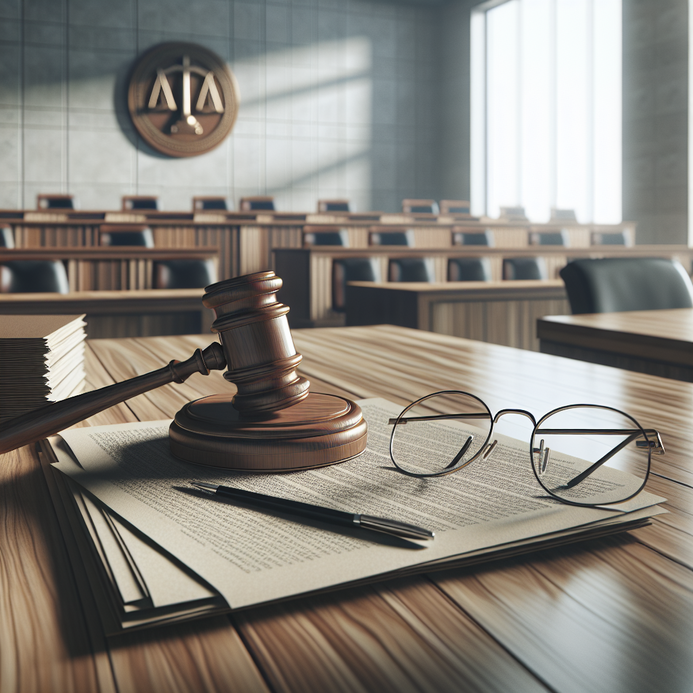Bankruptcy judges fulfill essential functions within the federal judicial system, presiding over cases governed by the U.S. Bankruptcy Code. They address disputes between creditors, debtors, and trustees, ensuring fair and equitable outcomes. A unique aspect of their role is their limited tenure compared to other federal judges, a distinction that shapes their responsibilities and court procedures.
This article explores the authority, structure, and appointment process of bankruptcy judges, breaking down their day-to-day operations and ethical challenges. By understanding the full scope of their judicial obligations, readers can better navigate the complexities of bankruptcy law. LegalExperts.AI simplifies such intricate legal concepts, empowering both professionals and the general public.
What is a Bankruptcy Judge?
A bankruptcy judge is a specialized federal judge tasked with handling cases under the United States Bankruptcy Code. These judges operate exclusively within bankruptcy courts, focusing on insolvency matters and related disputes.
What does a bankruptcy judge oversee?
Bankruptcy judges oversee the resolution of financial disputes and insolvency filings, primarily in:
- Bankruptcy filings under Chapters 7, 11, and 13.
- Disputes involving creditors, debtors, and bankruptcy trustees.
- Evaluations of repayment plans or authorization of asset liquidation.
How does bankruptcy relate to federal jurisdiction?
Bankruptcy courts are integral to the federal judiciary. They are organized under district courts and derive their authority from the U.S. Constitution and federal legislation. This alignment ensures that bankruptcy judges can oversee cases involving financial restructuring and insolvency under a structured legal framework.
Why are bankruptcy judges unique compared to other federal judges?
Unlike other federal judges, bankruptcy judges serve fixed 14-year terms rather than lifetime appointments. This distinction allows them to specialize solely in bankruptcy law, fostering focused expertise that benefits complex financial disputes.
Structure of Bankruptcy Judgeships and Courts
The organization of bankruptcy courts and judgeships reflects the unique legal landscape they address. Their structure ensures accessibility for resolving insolvency cases across the country.
Where are bankruptcy judgeships established?
Each federal judicial district includes a bankruptcy court, though the number and location of judgeships depend on the volume and complexity of cases within the district. These courts are strategically distributed to handle regional caseloads efficiently.
What is the jurisdiction of bankruptcy judges?
Bankruptcy judges exercise jurisdiction over cases involving individual or corporate insolvency, debt discharge, and financial restructuring. Their legal authority ensures they can manage filings, preside over disputes, and render enforceable decisions. Appeals of their rulings may proceed to district or appellate courts.
Historical background: How has the judgeship evolved?
Prior to the Bankruptcy Reform Act of 1978, bankruptcy court practices lacked uniformity. This critical legislation, alongside the Bankruptcy Amendments and Federal Judgeship Act of 1984, introduced standardized procedures and modernized the structure of bankruptcy judgeships, enabling more consistent legal outcomes.
Authority and Appointment of Bankruptcy Judges
Bankruptcy judges operate within clearly defined boundaries of authority and are selected through an extensive appointment process.
How are bankruptcy judges appointed?
Bankruptcy judges are appointed by the circuit courts of appeals for renewable 14-year terms. The selection process emphasizes candidates’ legal knowledge, case management experience, and ethical standing, ensuring only qualified individuals assume these pivotal roles.
What formal procedures govern their appointment?
The appointment process, regulated under 28 U.S. Code § 152, involves rigorous guidelines to guarantee impartiality and expertise. Recommendations often include input from community screening panels, public announcements, and judiciary-led evaluations.
What qualifications do bankruptcy judges typically hold?
Bankruptcy judges typically exhibit extensive experience in bankruptcy law, commercial litigation, or financial regulations. Many build their careers as attorneys or academics specializing in insolvency and corporate law, providing them with the technical skill set necessary for this demanding judicial role.
Roles and Responsibilities of Bankruptcy Judges
The responsibilities of bankruptcy judges encompass resolving legal disputes, approving financial plans, and navigating ethical dilemmas.
What is a bankruptcy judge’s role in individual cases?
In individual cases, bankruptcy judges address disputes between creditors and debtors, evaluate petitions for debt discharge, and oversee legal reviews related to property liquidation. Their rulings ensure that financial justice aligns with statutory requirements.
What daily tasks are performed by bankruptcy judges?
Bankruptcy judges engage in daily activities such as conducting hearings, issuing legal opinions, and managing procedural matters within their courts. Administrative responsibilities also form part of their workloads, ensuring that litigation processes operate seamlessly.
What ethical challenges do bankruptcy judges face?
Given the complex stakes of bankruptcy proceedings, ethical challenges often emerge. Judges must balance competing priorities between creditors’ rights and debtors’ protections, all while maintaining impartiality and mitigating potential conflicts of interest.
Common tools and technology used by bankruptcy judges
Modern tools significantly enhance the efficiency of bankruptcy courts:
- Courtroom Technology: Advanced electronic case filing systems support the organized handling of voluminous legal documents.
- Law Clerk Support: Judges rely on clerks to perform detailed legal research and draft preliminary opinions.
Professional Backgrounds of Bankruptcy Judges
The professional trajectories of bankruptcy judges underscore their expertise in navigating complex financial disputes.
What prior experience do most bankruptcy judges have?
Bankruptcy judges often emerge from longstanding careers as bankruptcy attorneys or legal academics. Many also have direct litigation experience in corporate finance or commercial disputes, equipping them to manage the multifaceted legal issues within their purview.
What distinguishes leading professionals like Chief Judge Natalie M. Cox?
Prominent judges like Chief Judge Natalie M. Cox are renowned for exemplary case management and mastery of bankruptcy law. Such leadership reflects the broader expertise and public trust vested in these individuals by the judiciary.
Additional Insights into Bankruptcy Courts and Judgeships
Key advancements and evolving priorities shape modern bankruptcy courts, offering insights into their operational trends.
How does courtroom technology improve judicial efficiency?
Courtroom technologies, including electronic filing platforms and real-time transcription tools, streamline bankruptcy proceedings. These solutions reduce administrative delays and enhance accessibility for all courtroom participants.
What are the chambers copy requirements for legal filings?
Bankruptcy judges customarily require attorneys to submit chambers copies of filed documents in addition to electronic filings. This dual submission ensures that physical copies are available for efficient court use, often aiding in real-time discussions during hearings.
Why are recent trends and decisions important?
Economic conditions heavily influence bankruptcy filings, setting new trends in judicial focus. Landmark rulings, particularly those addressing creditor-debtor dynamics, serve as critical benchmarks for financial policy and rights enforcement, shaping broader legal discourse.



